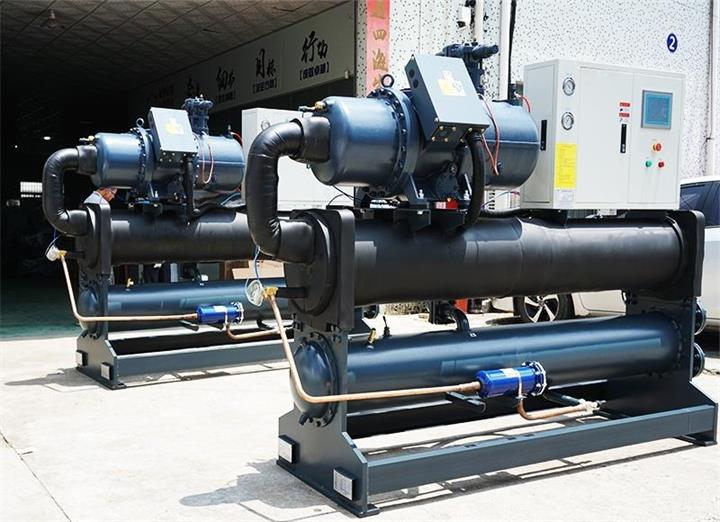Air-cooled screw chillers use fans for heat dissipation, making installation in an open, well-ventilated area essential. This ensures optimal cooling performance and improves efficiency. Typically, the fans are mounted on the top of the chiller, but some units may have side-mounted fans based on specific customer requirements.
However, excessive fan noise can be a common issue, affecting both operational efficiency and workplace comfort. Below, we analyze the main causes of high fan noise in air-cooled screw chillers and provide effective solutions.

1. Causes of High Fan Noise and Their Solutions
(1) Fan Rotating Too Fast
Cause:
- When the fan speed is too high, it generates strong airflow turbulence, leading to excessive noise.
Solution:
- Reduce the fan speed and check whether the noise level decreases.
- If noise remains high, consider replacing the fan with a low-noise model.
(2) Excessive Clearance and Component Wear
Cause:
- Over time, the fan components may experience wear and tear, leading to loose clearances, causing vibrations and noise.
Solution:
- Adjust the clearance to the appropriate position.
- If parts are significantly worn out, they cannot be repaired and should be replaced with new components.
(3) High Valve Flow Rate
Cause:
- If the valve flow rate is too high, it can create excessive airflow resistance and turbulence, increasing noise levels.
Solution:
- Adjust the valve settings to optimize flow and reduce unnecessary noise.
(4) Motor Issues
Cause:
- A faulty fan motor or an issue with the power supply may cause irregular fan operation, leading to unusual noise.
Solution:
- Inspect the motor and power supply for faults.
- Repair or replace damaged electrical components as needed.
(5) Lubrication Issues
Cause:
- Insufficient or poor-quality lubricant increases friction, leading to excessive mechanical noise.
Solution:
- Refill the lubricating oil to the required level.
- If the lubricant does not meet quality standards, replace it with certified, high-quality lubricating oil.
(6) Bearing Damage
Cause:
- Broken or worn-out bearings can cause the fan to operate irregularly, producing high noise and vibrations.
Solution:
- Contact the chiller manufacturer for bearing replacement.
(7) Fan Blockage
Cause:
- Obstructions in the air intake or exhaust outlets can disrupt airflow, leading to increased resistance and noise.
Solution:
- Inspect the air intake and exhaust for debris or blockages.
- Remove any obstructions to restore proper airflow.
2. Impact of High Fan Noise on Chiller Performance
If an air-cooled screw chiller experiences poor heat dissipation, it may result in:
❌ Reduced cooling efficiency
❌ Inadequate refrigeration capacity
❌ Failure to meet required cooling temperatures
❌ Increased energy consumption
Maintaining optimal fan performance is critical to ensure stable operation and prolong the lifespan of the chiller.
Conclusion
High fan noise in air-cooled screw chillers can result from various factors, including fan speed, component wear, lubrication issues, and motor problems. Identifying the root cause and implementing the right solutions can significantly reduce noise and improve the chiller’s efficiency.
✅ Regular maintenance and timely repairs are essential for ensuring smooth and quiet operation, enhancing both performance and longevity.
